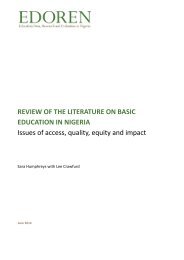review-of-the-literature-on-basic-education-in-nigeria-june-2014-3-1
review-of-the-literature-on-basic-education-in-nigeria-june-2014-3-1
review-of-the-literature-on-basic-education-in-nigeria-june-2014-3-1
Create successful ePaper yourself
Turn your PDF publications into a flip-book with our unique Google optimized e-Paper software.
Review <str<strong>on</strong>g>of</str<strong>on</strong>g> <str<strong>on</strong>g>the</str<strong>on</strong>g> <str<strong>on</strong>g>literature</str<strong>on</strong>g> <strong>on</strong> <strong>basic</strong> educati<strong>on</strong> <strong>in</strong> NigeriaCHAPTER 7: PROVIDERS OF NON-STATE, NON-FORMAL AND SPECIALEDUCATION7.1 Introducti<strong>on</strong>Policy <strong>in</strong> regard to n<strong>on</strong>-state providers <str<strong>on</strong>g>of</str<strong>on</strong>g> <strong>basic</strong> educati<strong>on</strong> is set by <str<strong>on</strong>g>the</str<strong>on</strong>g> 2004 Nati<strong>on</strong>al Policy <str<strong>on</strong>g>of</str<strong>on</strong>g> Educati<strong>on</strong>(FME 2004a: 17), which states that:Government welcomes <str<strong>on</strong>g>the</str<strong>on</strong>g> c<strong>on</strong>tributi<strong>on</strong>s <str<strong>on</strong>g>of</str<strong>on</strong>g> voluntary agencies, communities and private <strong>in</strong>dividuals <strong>in</strong> <str<strong>on</strong>g>the</str<strong>on</strong>g>establishment and management <str<strong>on</strong>g>of</str<strong>on</strong>g> primary schools al<strong>on</strong>gside those provided by <str<strong>on</strong>g>the</str<strong>on</strong>g> state and localgovernments, as l<strong>on</strong>g as <str<strong>on</strong>g>the</str<strong>on</strong>g>y meet <str<strong>on</strong>g>the</str<strong>on</strong>g> m<strong>in</strong>imum standards laid down by <str<strong>on</strong>g>the</str<strong>on</strong>g> Federal Government.Fur<str<strong>on</strong>g>the</str<strong>on</strong>g>rmore, <str<strong>on</strong>g>the</str<strong>on</strong>g> UBEC impact assessment c<strong>on</strong>cluded that <str<strong>on</strong>g>the</str<strong>on</strong>g>re should be an ‘expanded role for privateschools’ (UBEC 2012a).Across Nigeria, around a quarter <str<strong>on</strong>g>of</str<strong>on</strong>g> primary school pupils are enrolled <strong>in</strong> private schools, some <str<strong>on</strong>g>of</str<strong>on</strong>g> whichare religious (NPC and RTI Internati<strong>on</strong>al 2011). The bulk <str<strong>on</strong>g>of</str<strong>on</strong>g> <str<strong>on</strong>g>the</str<strong>on</strong>g> pupils <strong>in</strong> religious schools are Muslimchildren attend<strong>in</strong>g Qur’anic schools, which <strong>in</strong> parts <str<strong>on</strong>g>of</str<strong>on</strong>g> <str<strong>on</strong>g>the</str<strong>on</strong>g> country are be<strong>in</strong>g <strong>in</strong>tegrated <strong>in</strong>to <str<strong>on</strong>g>the</str<strong>on</strong>g> publicschool system to vary<strong>in</strong>g extents.The chapter first c<strong>on</strong>siders for-pr<str<strong>on</strong>g>of</str<strong>on</strong>g>it private schools before look<strong>in</strong>g at religious schools and ECCE. Strictlyspeak<strong>in</strong>g, ECCE should not be a topic <str<strong>on</strong>g>of</str<strong>on</strong>g> focus <strong>in</strong> this chapter as it is has now become part <str<strong>on</strong>g>of</str<strong>on</strong>g> <str<strong>on</strong>g>the</str<strong>on</strong>g>government commitment to <strong>basic</strong> educati<strong>on</strong>; however, s<strong>in</strong>ce it was <strong>in</strong>itiated <strong>in</strong> <str<strong>on</strong>g>the</str<strong>on</strong>g> private sector and isstill predom<strong>in</strong>antly provided by n<strong>on</strong>-state providers, it is <strong>in</strong>cluded here.The spotlight <str<strong>on</strong>g>the</str<strong>on</strong>g>n turns to adult NFE provided by <str<strong>on</strong>g>the</str<strong>on</strong>g> government for those who have missed out <strong>on</strong><strong>basic</strong> educati<strong>on</strong>. NFE focuses <strong>on</strong> <strong>basic</strong> literacy tra<strong>in</strong><strong>in</strong>g and is overseen by <str<strong>on</strong>g>the</str<strong>on</strong>g> NMEC. We <str<strong>on</strong>g>the</str<strong>on</strong>g>n report <strong>on</strong>school<strong>in</strong>g for nomadic populati<strong>on</strong>s, before c<strong>on</strong>sider<strong>in</strong>g educati<strong>on</strong>al provisi<strong>on</strong> for pupils with disabilities.7.2 School choiceNEDS 2010 c<strong>on</strong>ta<strong>in</strong>s some analysis <str<strong>on</strong>g>of</str<strong>on</strong>g> <str<strong>on</strong>g>the</str<strong>on</strong>g> factors affect<strong>in</strong>g school choice, f<strong>in</strong>d<strong>in</strong>g that 72% <str<strong>on</strong>g>of</str<strong>on</strong>g> pupilsattend <str<strong>on</strong>g>the</str<strong>on</strong>g> primary school closest to <str<strong>on</strong>g>the</str<strong>on</strong>g>ir house. There are substantial urban/rural differences <strong>in</strong> thisregard, however, reflect<strong>in</strong>g <str<strong>on</strong>g>the</str<strong>on</strong>g> greater choice <str<strong>on</strong>g>of</str<strong>on</strong>g> nearby school afforded by dense populati<strong>on</strong> <strong>in</strong> <str<strong>on</strong>g>the</str<strong>on</strong>g>large cities (NPC and RTI Internati<strong>on</strong>al 2011). Children from poorer households are also more likely toattend <str<strong>on</strong>g>the</str<strong>on</strong>g> school closest to <str<strong>on</strong>g>the</str<strong>on</strong>g>ir house than children from wealthier households. When asked directlyabout <str<strong>on</strong>g>the</str<strong>on</strong>g> reas<strong>on</strong>s for choice <str<strong>on</strong>g>of</str<strong>on</strong>g> primary school, proximity was <strong>in</strong> general <str<strong>on</strong>g>the</str<strong>on</strong>g> most comm<strong>on</strong> resp<strong>on</strong>se(53% <str<strong>on</strong>g>of</str<strong>on</strong>g> parents), followed by school quality (30%) and cost (13%), with <strong>on</strong>ly 1% report<strong>in</strong>g religious orsecurity issues.Quality and price are more important factors for wealthier households and <strong>in</strong> <str<strong>on</strong>g>the</str<strong>on</strong>g> wealthier sou<str<strong>on</strong>g>the</str<strong>on</strong>g>rnregi<strong>on</strong>s. Proximity is more important for poorer households and <strong>in</strong> <str<strong>on</strong>g>the</str<strong>on</strong>g> poorer nor<str<strong>on</strong>g>the</str<strong>on</strong>g>rn regi<strong>on</strong>s, where<str<strong>on</strong>g>the</str<strong>on</strong>g>re is likely to be less choice and distances to school are l<strong>on</strong>ger. Interest<strong>in</strong>gly, religi<strong>on</strong> and security arec<strong>on</strong>sistently rare reas<strong>on</strong>s given for school choice by all different k<strong>in</strong>ds <str<strong>on</strong>g>of</str<strong>on</strong>g> households (ibid.).At sec<strong>on</strong>dary level (both JSS and Sec<strong>on</strong>dary School), <str<strong>on</strong>g>the</str<strong>on</strong>g> 2010 NEDS notes that school quality takespriority over distance to school (44% to 32%), followed by cost (21%). Once aga<strong>in</strong>, security and religi<strong>on</strong>pay <strong>in</strong>significant roles <strong>in</strong> school choice (NPC and RTI Internati<strong>on</strong>al 2011).EDOREN – Educati<strong>on</strong> Data, Research and Evaluati<strong>on</strong> <strong>in</strong> Nigeria 70



